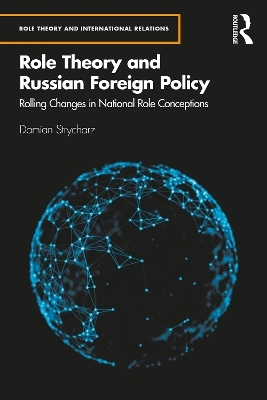
Role Theory and Russian Foreign Policy
Routledge (Verlag)
978-1-032-11282-4 (ISBN)
Despite the increased interest in Russia and its international behaviour, current analyses leave much unexplained. Damian Strycharz fills this gap in the literature by analysing leaders’ perceptions and the interactions between internal and external factors shaping foreign policy decisions.
Challenging existing interpretations of Russian foreign policy and advancing our understanding on how role dynamics occur in non-democracies, Strycharz examines Russia’s reactions to the 2003–4 colour revolutions in Georgia and Ukraine, the Five-Day War in Georgia, and the Euromaidan Revolution. He argues that divergent reactions to these upheavals result from a profound change in the leadership perceptions of Russia’s international responsibilities. Consequently, a shift in the understanding of Russia’s international duties and departure from the Western partner role resulted in more assertive foreign policy behaviour exemplified by the intervention in Georgia and the annexation of Crimea. The book demonstrates that processes of foreign policy formation in Russia are more complex and include more actors than commonly assumed.
Role Theory and Russian Foreign Policy is an ideal resource for scholars and researchers of international relations, foreign policy, and post-Soviet politics.
Damian Strycharz is an assistant professor of Political Science at the Cracow University of Economics. Damian holds a PhD in Politics and International Relations from the University of Edinburgh. His research interests include Russia’s foreign policy and relations with the former Soviet states, domestic political sources of foreign policy, and role theory. He has held positions at the University of Edinburgh and Jagiellonian University, Cracow.
Introduction 1. Domestic actors in Russia’s foreign policy-making 2. Russia's foreign policy and role theory 3. Methods and codebook 4. Internal development, partnership with the West and the Rose Revolution 5. The Orange Revolution and the dominance of the partner of the West role 6. Russia’s changing self-perception and intervention in Georgia 7. The Ukraine crisis and the defender of compatriots role 8. Shifts in dominant national role conceptions and changes in Russia’s foreign policy 9. Conclusions
| Erscheinungsdatum | 11.04.2022 |
|---|---|
| Reihe/Serie | Role Theory and International Relations |
| Zusatzinfo | 18 Tables, black and white; 1 Line drawings, black and white; 1 Illustrations, black and white |
| Verlagsort | London |
| Sprache | englisch |
| Maße | 152 x 229 mm |
| Gewicht | 453 g |
| Themenwelt | Naturwissenschaften ► Geowissenschaften ► Geografie / Kartografie |
| Sozialwissenschaften ► Politik / Verwaltung ► Europäische / Internationale Politik | |
| Sozialwissenschaften ► Soziologie ► Spezielle Soziologien | |
| ISBN-10 | 1-032-11282-4 / 1032112824 |
| ISBN-13 | 978-1-032-11282-4 / 9781032112824 |
| Zustand | Neuware |
| Haben Sie eine Frage zum Produkt? |
aus dem Bereich


